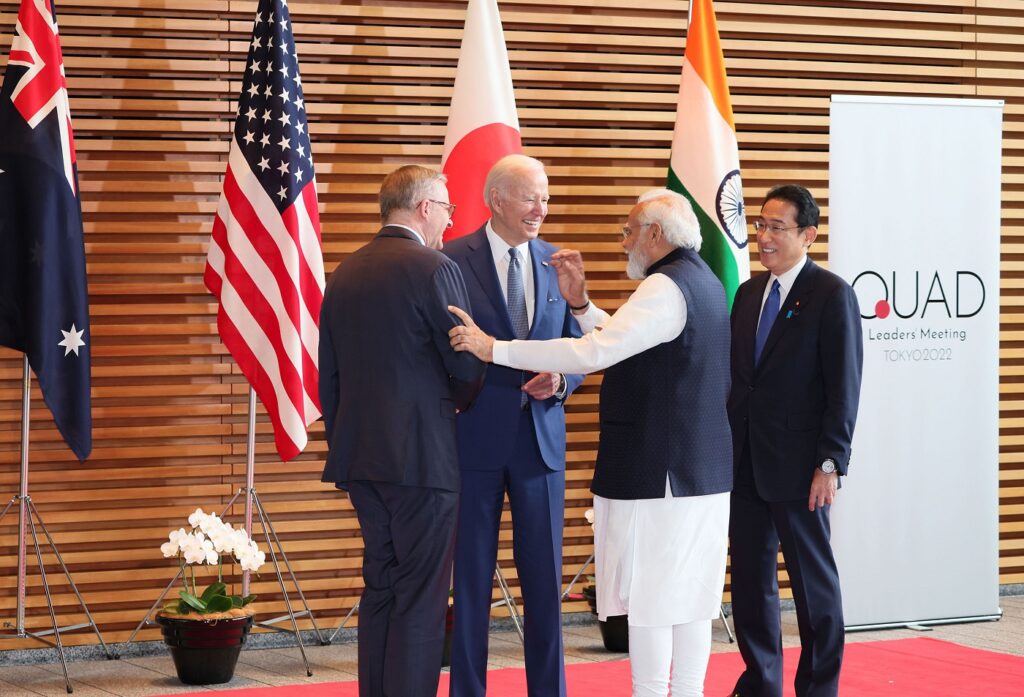The Quad was revived in Donald Trump’s first term as president, but that does not guarantee he will pay much attention to it during his second. Non-US Quad members will need to demonstrate its ongoing value, make its purpose clear and find a strong advocate to make this case.
Back in 2017 the resurrection of the Quad was one of the strongest signals that, after almost a year of uncertainty in Asia policy, the first Trump administration had committed to strategic competition with China. Its revival was met with almost audible sighs of relief in Canberra, New Delhi and Tokyo, where fear of abandonment had gripped policy elites since the election. Australia, Japan and India had all been rattled by the new president’s open hostility to alliances and by talk that he might cut a grand bargain with Xi Jinping over their heads. The Quad’s revival showed that the Trump administration was more committed to regional security and prosperity and more convinced of the value of working with long-standing partners than the president’s rhetoric had sometimes suggested.
Since then the Quad has evolved beyond a vehicle for reassuring friends, signalling resolve, sharing assessments of China’s capabilities and intentions and discussing ways to work together more closely and effectively. It now has a broad agenda, ranging from artificial intelligence to space situational awareness, and year-round interaction, from leaders’ summits to ambassadorial meetings.
Yet none of this—neither the history nor the activity nor the level of trust and comfort felt by officials involved in these processes—ensures the Quad will survive or prosper during the second Trump administration. The president-elect is not known for sentimentality, so the revival of the Quad that he saw on his watch is unlikely to sway his view of its value. Trump is likely to ask how much the minilateral costs the United States and what it delivers, not in terms of public goods provided to others but tangible gains for American interests.
Canberra, New Delhi and Tokyo may be able to work with Trump’s national security team to find at least some answers to these questions, as they did during his first term. As secretary of state during much of that time, Mike Pompeo emerged as a strong champion of the Quad, facilitating the upgrades to regular foreign ministers’ meetings and then leaders’ summits. In theory at least, any one of the China hawks whom Trump has nominated for high positions—Marco Rubio for secretary of state, Peter Hegseth as secretary of defense and Mike Waltz as national security advisor—could play a similar role, if the Senate approves their appointments.
The problem, however, is that the Quad lacks a robust advocate outside the US. In 2017 prime minister Shinzo Abe quickly established himself as an adept Trump whisperer, proposed the reconvening of the grouping and rallied regional allies and partners to the cause. Today, it is not clear whether Anthony Albanese, Narendra Modi or Shigeru Ishiba are willing and able to do the job.
Of the three, Albanese is the least likely, given the looming election. The Indian prime minister is better positioned, given an established relationship with Trump and a relatively successful track record of playing to his whims. Modi is also due to host the next Quad summit in India, sometime in 2025. But Japan’s newly elected leader might be the best candidate for the role.
Ishiba has long spoken with clarity on regional security—and clarity is one thing the Quad needs. Politicians and bureaucrats from all four members will tell anyone who asks, entirely sincerely, that the grouping has achieved much in the last seven years. But even they still struggle to express what it aims to do and why it operates as it does. The sprawling and ever-expanding agenda does not help. Nor does a certain evasiveness in talking about China, due partly to deference to sensitivities of Southeast Asian elites, and reluctance to even talk about quadrilateral defence cooperation.
This timid approach is unlikely to find much sympathy in the Trump White House. If the Quad is to survive and continue the good work it is doing on maritime security, critical technologies, cyber and connectivity, it will need a harder edge and a clearer purpose. The region does not need the Asian NATO that Ishiba has mooted, but there is good work the Quad could and should do to deter Chinese and indeed Russian adventurism in the Indo-Pacific. Front and centre should be defence industrial and technological cooperation; enhanced interoperability; capacity-building for regional navies and air forces, not just coastguards; improved logistics and rights of access; and greater intelligence- and data-sharing.
This agenda will not succeed, however, if it makes greater demands on US leadership and resources. Others need to step up, and fast.

